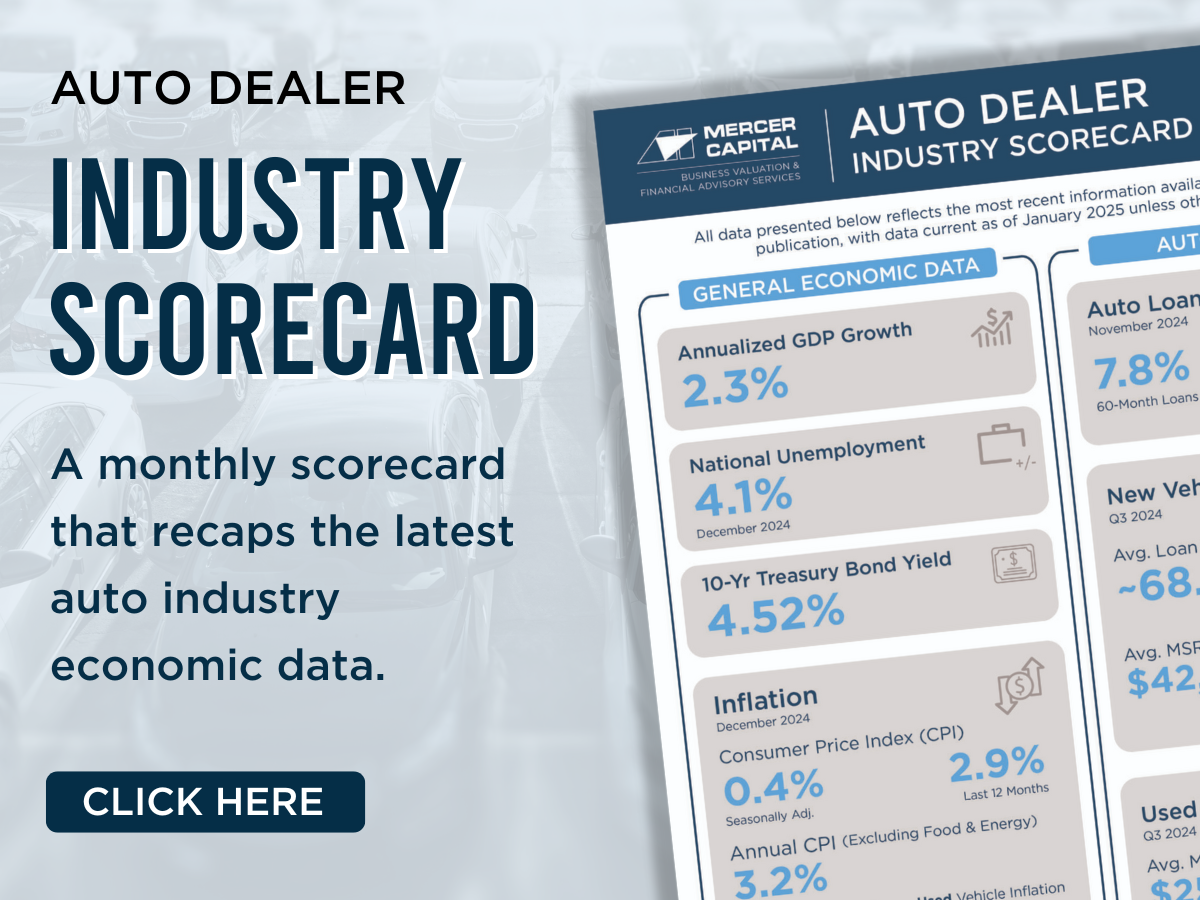6 Events That Warrant a Business Valuation of an Auto Dealership
Like most business owners, auto dealers are focused on many aspects of their business: daily operations, strategic vision, competition, industry conditions, the state of the economy, etc. It is less common for auto dealers to be concerned if/when their business needs to be valued. Often, they are made aware of the need for these services by their trusted advisors, including attorneys, financial planners, accountants, etc.
What common events would require a business valuation of an auto dealership?
1. Estate Planning/Wealth Transfer – Successful dealerships can accumulate tremendous value over time. Estate planning allows the first generation of a family to transfer wealth to the next generation through various mechanisms. Individuals and couples can take advantage of the lifetime exemption amounts by transferring value to the current taxable exemption of $92 million for individuals or $25.84 million for couples over their lifetime.¹ Gifting strategies can also utilize the annual exclusion amount of $17,000 per individual. Implementing these strategies includes many different structures requiring the valuation of the auto dealership and the specific interest being transferred. A proper valuation assists in protecting the integrity of these transactions. Failure to support the concluded figures with a proper valuation can often lead to these transactions being challenged or audited, causing a later-described litigation dispute.
2. Death of a Dealer Principal/Owner – For certain estates, an income tax return and Form-706 will have to be filed in a timely manner after the date of death. If the decedent is an owner of a business, or in this case, an auto dealership, the value of the decedent’s interest will have to be valued. The valuation will need to be performed by a qualified business appraiser that can support the dealership’s value and specific ownership interest through accepted methodologies.
3. Buy/Sell Agreement – In a prior blog post, we discussed the seven elements of a highly effective buy-sell agreement. This document and other corporate governance documents describe the process and criteria for a business valuation and often require an initial valuation to set the stock price for triggering events governed by the document. Some buy-sell agreements require updated valuations at regular intervals or upon the occurrence of future triggering e Following the provisions in these documents and maintaining regular valuations can aid in limiting or avoiding litigation disputes.
4. Strategic Planning – Business valuations can also assist auto dealers with strategic planning. Not only can a valuation indicate value at a specified point in time, but successive or regular valuations can track value over time. These valuations could be helpful for auto dealers contemplating incentive programs to reward ownership to key management. Auto dealers can also discover the value drivers of the current appraisal and set goals to enhance value by improving those value drivers over time.
5. Potential Sale of Dealership – At some point, successful auto dealers may contemplate a possible exit event. If there isn’t a viable second generation to continue the operations, a sale of the dealership may be the next best option. The auto dealer industry has proved resilient and adaptable over the last few years following the pandemic. Industry transaction activity remains high for both public and private acquirers. Most auto dealers that have owned a dealership for some time have likely been contacted by an interested party through phone or mail. If you have not had a recent business valuation, how can you evaluate any offers or know what your dealership is worth? A business valuation can inform you of dealership value and manage expectations to assess potential offers.
6. Litigation Dispute – The following three events described all fall under the litigation umbrella, but each is a unique event caused by some of our typical engagements.
6a. Shareholder Disputes – These can come in many forms: breach of contract, wrongful termination, damages, etc. In any of these scenarios, the value of the entire dealership and a specific ownership interest will be contested. A valuation and possible testimony can assist the attorneys and/or triers of fact in determining the case’s outcome. Certain components of an auto dealership’s value, such as Blue Sky Value, can also be critical to the case.
6b. Taxation Dispute – If a proper valuation was not utilized in an estate planning transfer or the IRS is challenging the valuation, another form of litigation involving a taxation dispute could arise. These disputes require similar elements as in a shareholder dispute—valuation of dealership, value of specific ownership interest, and possibly testimony. A unique element of taxation disputes is that generally, an expert’s valuation report also serves as their direct testimony should the matter end up in trial. The valuation report must communicate the expert’s methodology and support their conclusions for the dealership’s value and applicable discounts, such as lack of marketability, voting rights, etc.
6c. Family Law Dispute – While not a popular topic, auto dealers or their spouses in the midst of divorce would also need a business valuation and potential expert witness services. In a divorce, all of the couple’s assets and liabilities must be compiled and valued to assist the attorneys and trier of fact in asset division and other matters. Some assets, such as bank accounts and real estate, are easier to value. Other assets, such as business assets, can be more challenging to value. In the auto dealer universe, these business assets can consist of more than one entity. Many dealerships are organized where the dealership operations and franchise agreement are contained in one entity, while a separate asset-holding entity may own the underlying real estate. In this example, both entities would need to be valued, and the methodologies to value each differ. Some auto dealers may own additional entities, such as separate repair and body shops or re-insurance companies that might require a business valuation.
Conclusion
Business valuations are triggered by certain events, with some being more obvious than others. Knowing the circumstances that dictate the need for business valuations, auto dealers can be more educated in using these services. As we have previously written, the auto dealer industry is unique to valuation in the methodologies employed, the terminology communicated, and the financial information utilized. Should the selection of the business appraiser consist of a valuation expert or an industry expert? Why not have both?
Contact a professional at Mercer Capital to assist you with a business valuation or consultation of your auto dealership and related businesses for any of these events or others.
 Auto Dealer Valuation Insights
Auto Dealer Valuation Insights 








